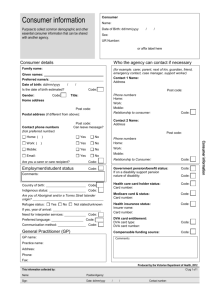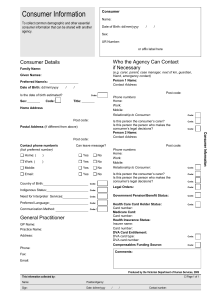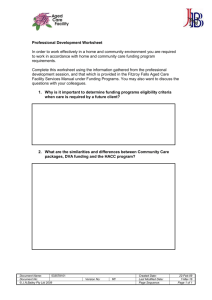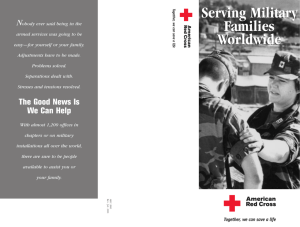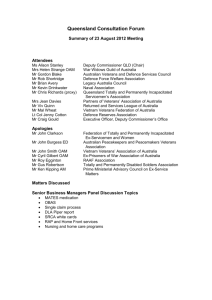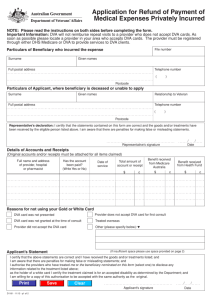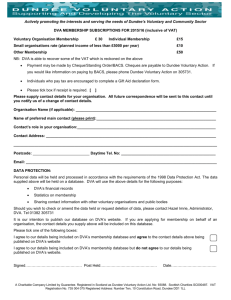Seeking Prior Financial Authorisation
advertisement
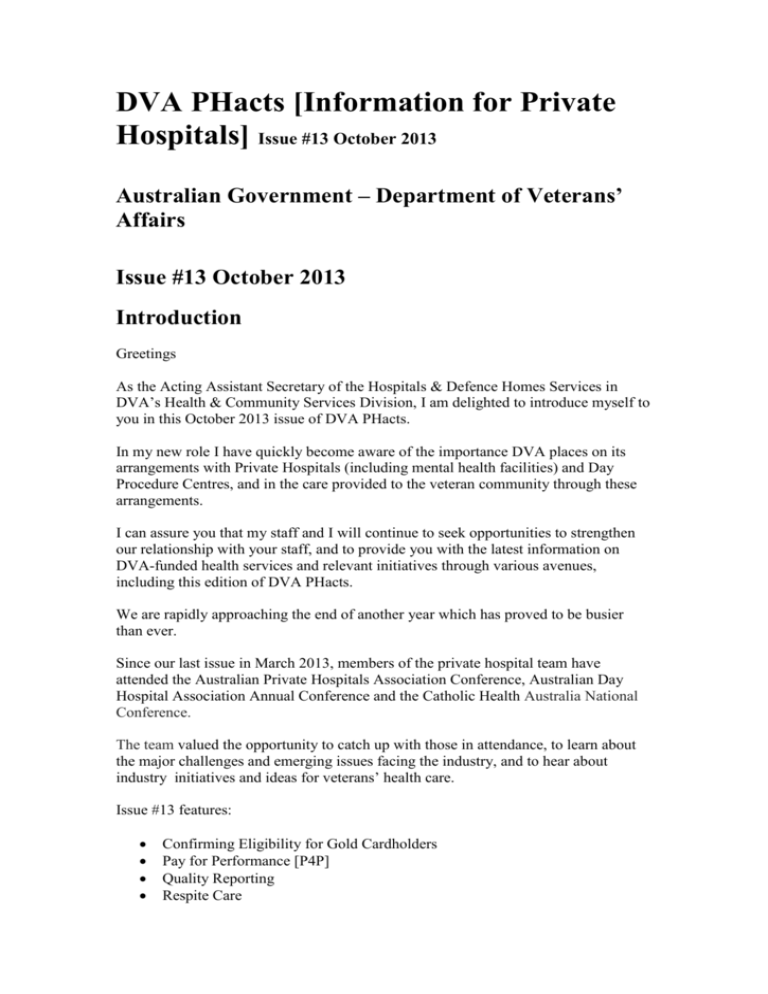
DVA PHacts [Information for Private Hospitals] Issue #13 October 2013 Australian Government – Department of Veterans’ Affairs Issue #13 October 2013 Introduction Greetings As the Acting Assistant Secretary of the Hospitals & Defence Homes Services in DVA’s Health & Community Services Division, I am delighted to introduce myself to you in this October 2013 issue of DVA PHacts. In my new role I have quickly become aware of the importance DVA places on its arrangements with Private Hospitals (including mental health facilities) and Day Procedure Centres, and in the care provided to the veteran community through these arrangements. I can assure you that my staff and I will continue to seek opportunities to strengthen our relationship with your staff, and to provide you with the latest information on DVA-funded health services and relevant initiatives through various avenues, including this edition of DVA PHacts. We are rapidly approaching the end of another year which has proved to be busier than ever. Since our last issue in March 2013, members of the private hospital team have attended the Australian Private Hospitals Association Conference, Australian Day Hospital Association Annual Conference and the Catholic Health Australia National Conference. The team valued the opportunity to catch up with those in attendance, to learn about the major challenges and emerging issues facing the industry, and to hear about industry initiatives and ideas for veterans’ health care. Issue #13 features: Confirming Eligibility for Gold Cardholders Pay for Performance [P4P] Quality Reporting Respite Care Convalescent Care Services DVA Booked Car Scheme DVA Resources for Mental Health Practitioners I encourage you to share this edition of DVA PHacts with other interested staff at your facility. As always we welcome your feedback and suggestions for topics for the next issue of PHacts. Please send your comments to HospitalContracting@dva.gov.au On behalf of DVA I would like to take this opportunity to thank you for the care you provide to the veteran community and to reflect on the upcoming anniversary of Remembrance Day and on that note share with you the following. Remembrance Day World War I began in 1914 and lasted for four years. More than 416 000 Australians volunteered for service in World War I. Of these, 324 000 served overseas. More than 60 000 Australians were killed, including 45 000 who died on the Western Front in France and Belgium and more than 8 000 who died on the Gallipoli Peninsula in Turkey. As well as Australian soldiers, many nurses in the Australian Army Nursing Service served on the Western Front. These nurses worked in overcrowded hospitals for up to 16 hours a day, looking after soldiers with shocking injuries and burns. Those who worked in hospitals close to the fighting were also in danger of being shelled by the enemy. In October 1997 the then Governor-General issued a Proclamation declaring 11 November as Remembrance Day - a day to remember the sacrifice of those who have died for Australia in wars and conflicts. As a mark of respect to those who have died and suffered, people in Australia are encouraged to stop what they are doing at 11am to observe one minute’s silence and reflect on the loss and suffering caused by war. Lest we forget. If you would like to receive commemorative material for this year’s Remembrance Day commemoration you will need to send your order [including name and address of facility] to the DVA PHacts mailbox at: HospitalContracting@dva.gov.au 2 Thank you once again. Alison Hale Acting Assistant Secretary Hospitals & Defence Homes Services October 2013 3 Confirming eligibility for Gold Cardholders A number of private hospitals have been contacting the Department in recent months seeking to confirm eligibility and/or requesting prior approval for veterans presenting with DVA Repatriation Gold Cards. However, under DVA’s current private hospital contractual arrangements prior approval is only required in limited instances and these are explained below. Please be assured that in most cases it will be unnecessary for hospitals to contact DVA to confirm eligibility especially where a Gold Card is sighted. Gold Cardholders Gold Cardholders are entitled to treatment of most conditions, however, prior financial authorization must be sought for some services and treatment. These are: respite care or convalescent care; Surgical/Medical procedures not listed on the MBS; and Specific treatments nominated in writing by DVA from time to time (e.g. cosmetic surgery). Unless the patient is being admitted for the above reasons (respite care or convalescent care; procedures not listed on the MBS, or specific treatments such as cosmetic surgery) prior approval is not required and no authorisation letter will be issued. Patients who are Repatriation Card holders may also elect to be treated outside DVA arrangements. In those circumstances DVA is unable to accept financial responsibility for any part of the admission. White Cardholders White Cardholders continue to be eligible for treatment only for those specific conditions for which DVA has accepted financial responsibility. DVA will not be responsible for payment for the treatment of any person admitted to the hospital who, at the time of admission, was not an entitled veteran with eligibility for the treatment provided. 4 If a veteran presents with a White Card and eligibility for treatment is uncertain, you should confirm eligibility with DVA to ensure treatment costs will be met by DVA. For emergency treatment outside business hours, financial authorisation should be sought from DVA on the first business day after the treatment. Letters of Authorisation Holders of Letters of Authorisation may have treatment authorised under any of the following Acts: Veterans’ Entitlements Act 1986, Military Rehabilitation and Compensation Act 2004, Australian Participants in British Nuclear Tests (Treatment) Act 2006, or Safety, Rehabilitation and Compensation Act 1988. As provision of services may vary amongst all four Acts, hospitals should phone the contact officers on the letters if they wish to clarify entitlements and any specific billing arrangements. Seeking Prior Financial Authorisation Where prior financial authorisation is required, you should: complete a hospital admission request or provide a written request from a doctor, and fax it to DVA on (08) 8290 0422; or contact DVA during business hours by telephoning 1300 550 457 (metro) or 1800 550 457 (non metro). To assist in streamlining your admissions procedures, please telephone DVA only if the client holds a white card and you wish to check eligibility. 5 Pay for Performance [P4P] Patient Satisfaction Survey Questionnaire The Patient Satisfaction Survey (the Survey) questionnaire was introduced into the private hospitals’ Hospital Service Agreements [HSA] in 2009. The questionnaire is to be given to all DVA patients on discharge who have had an overnight acute care medical or surgical hospital admission. For those hospitals wishing to participate in the P4P initiative, participation in the Survey is a requirement under clause 7.4 of the current 2012 HSA. As noted in March 2013 correspondence, the importance that the Department places on this Survey was reinforced by the decision to increase the weighting of the Survey in the P4P annual assessment from 25% to 30%. It is therefore disappointing that the participation rates reflected in the latest round of survey results [January to June 2013] are patchy with a number of private hospitals falling well below the rates required to achieve statistically valid findings. To achieve an appropriate distribution rate to be scored as part of the overall P4P assessment, it is most important that your staff continue to distribute questionnaires to all DVA patients who have had an overnight stay. Hospitals also need to send the reporting spreadsheet each month to Neilsen at dvap4p@neilsen.com with the details of the questionnaires that have been given out. Most hospitals are putting in a great effort with the Survey, and we encourage your continued effort. For those hospitals that are still to become fully engaged, we encourage you to review the process you have in place for managing the Survey so that your efforts are better rewarded. If you have any questions at all with this article or any other aspect of P4P please direct them to PayforPerformanceP4P@dva.gov.au Quality Reporting Quality Reporting templates have been updated and are now available on DVA’s website. You will need to submit your quality report for the period 1 July 2012 to 30 June 2013 (or 1 January 2013 to 30 June 2013 for Day Procedure Centres) by 31 October 2013. Please don’t forget to include your initiatives targeted at the aged community and details of de-identified complaints. 6 DVA-Funded Respite Care What is it? DVA-funded respite care is not convalescent or transitional care. Respite care is a provision to relieve carers who have the responsibility for caring for someone requiring ongoing care, attention or support. Respite care enables carers to have a break from the caring role. DVA funds two types of respite care: In-home respite. This type of respite allows a carer to have a break while a substitute carer comes into the home to take over the role of caring for the care recipient. Residential respite. This type of respite provides short-term care for the care recipient in an Australian Government-subsidised aged care facility. DVA also funds emergency respite on a short-term basis where the carer is suddenly or unexpectedly unable to continue the caring role. However, this article will only focus on in-home respite and residential respite. Who is eligible for DVA-funded respite care? DVA-funded respite care is only available to entitled persons to whom DVA has issued a: Repatriation Health Card – For All Conditions (Gold Card); or Repatriation Health Card – For Specific Conditions (White Card). However, certain conditions apply as explained below. DVA-Funded In-Home Respite Only available to entitled persons who are: being cared for and their carer needs a break from the caring role; or caring for someone and they need a break from the caring role. Entitled persons without a carer are not eligible for in-home respite. DVA-Funded Residential Respite Only available to entitled persons who: are being cared for and their carer is in need of a temporary break from the caring role; or do not have a carer, but are in need of respite care; and intend to return to the community/home. 7 Carers who have not been issued a Repatriation Gold or White Card by DVA are not eligible for DVA-funded residential respite in an Australian Government subsidised aged care facility. An assessment by and approval from an Aged Care Assessment Team (ACAT) (or Aged Care Assessment Service in Victoria (ACAS)) is required prior to entry into an Australian Government subsidised aged care facility. Only provided where the entitled person has a valid ACAT/ACAS approval and enters the Australian Government subsidised aged care facility from home or independent living. DVA will not fund residential respite if it directly follows a period of DVA-funded convalescent care. How much DVA-funded respite care is available? In any one financial year, DVA will fund a total of: 196 hours of in-home respite; or 28 days of residential respite (the basic daily care fee)*; or a combination of both that does not exceed 28 days/196 hours. If a combination of in-home respite and residential respite is accessed in a financial year, for calculation purposes seven hours of in-home respite is counted as one day of residential respite. * The Australian Government pays a subsidy to aged care facilities for up to 63 days in a financial year for people who have been assessed by an ACAT/ACAS as needing residential respite. In addition to this subsidy, DVA will pay the basic daily care fee to aged care facilities for up to 28 days (196 hours) of the 63 days in a financial year for entitled persons only. However, if the entitled person is an Australian former Prisoner of War or a Victoria Cross recipient, DVA will pay the basic daily care fee for up to 63 days. How is DVA-funded respite care arranged? DVA-funded respite care is arranged by obtaining financial authorisation from the Veterans’ Home Care Assessment Agency (VHC AA) prior to the commencement of the respite period; failure to do so could compromise the provision of DVA funding. Prior financial authorisation can be sought by hospital discharge planners, the Local Medical Officer (LMO) or General Practitioner (GP), entitled persons or the entitled person’s family, friends or advocate. Prior financial authorisation cannot be sought by Australian Government subsidised aged care facilities on behalf of the entitled person. To contact the VHC AA, ring 1300 550 450. 8 The VHC AA will confirm the entitled person’s eligibility for DVA-funded respite care and conduct an assessment over the telephone. Convalescent Care Services What is it? Convalescent care is designed to provide Eligible Persons with a period of recovery following either an acute illness or operation in an acute hospital setting funded by DVA. A DVA delegate may authorise convalescent care at one of the following facilities providing such care: Residential Aged Care Facility [RACF]; convalescent or supported care home; and private hospital How is Convalescent Care accessed? Entitled Persons’ treating doctors or hospital discharge planners must obtain prior financial authorisation from DVA on telephone 1300 550 457 [metro] or 1800 550 457 [regional] prior to arranging convalescent care anywhere other than a public hospital1; failure to do so could compromise the provision of DVA funding. Do any other conditions apply? Yes the following condition applies: treating hospital staff must arrange an assessment by an Aged Care Assessment Service prior to placing an Entitled Person in a RACF for convalescent care; however, in Victoria, where all efforts to identify a Government funded facility have been exhausted and an Eligible Person has not been assessed by an Aged Care Assessment Team [ACAT], DVA will fund Convalescent Care for Eligible Persons in a Supported Residential Service [supported care home] subject to prior financial authorisation. Such funding decisions are based on the fact that an assessment has not been made by an ACAT and that the Supported Residential Service is not government funded. What are my entitlements to convalescent care? In any one financial year, eligible veterans are entitled to be assessed for a maximum of 21 days which equates to 21 nights’ accommodation. 1 Convalescent care in a public hospital setting is usually accommodated under transition care arrangements without the requirement for prior financial authorisation from DVA. 9 DVA Booked Car Scheme The Booked Car Scheme (also known as Booked Car with Driver) is available to Eligible Persons when they attend a health provider for approved medical treatment. DVA engages the services of taxi and hire car providers to transport entitled DVA clients to and from these medical appointments. Health providers, veterans, war widows or their carers can book transport by contacting Veterans’ Transport Services during business hours on the following numbers: Metro Non Metro 1300 550 455 1800 550 455 DVA Online Transport Booking System for Health Providers In September 2011, DVA introduced a new online transport booking system available to health providers. This is a national booking system which uses a secure web interface and will allow health providers to make, monitor and update transport bookings in real time. It will also allow for the automatic allocation of bookings to DVA’s contracted transport providers. The online transport booking system allows health providers to make future, same day and ‘ready now’ bookings at any time of the day or night, at their own convenience, and without having to wait in a telephone queue. The system clearly shows the current status of bookings so that health providers can be assured the booking has been actioned appropriately. To access further information and necessary steps to get online you can go to: https://connect.dva.gov.au and click on “Register” to find out how to get online and download our user guides. Enquiries regarding these new arrangements can be directed to: Email: hponline@dva.gov.au You can find more information about veterans’ and war widows entitlements for travelling to approved treatment at: http://www.dva.gov.au/benefitsAndServices/transport/Pages/index.aspx 10 DVA Resources for Mental Health Practitioners With the increased deployment in recent years, you may be treating a new generation of veterans with different needs and experiences. DVA is seeking to ensure you are able to deliver the most effective mental health care for veteran patients, with a range of veteran-specific resources reflecting evidence-based practice. Two new resources now available include: The At Ease Professional website offers you one-stop access to the latest veteran mental health research, assessment tools, evidence-based treatment, outcome tools and patient resources for common veteran mental health conditions. Visit At Ease Professional. By subscribing to the news service on At Ease Professional you will receive regular updates on veteran mental health research, resources and news. A free online training program Understanding the Military Experience, is also available on the At Ease Professional website. This two-hour training course will help you better understand the context in which veteran patients are presenting and the long-term effects that military service can have on their mental health and wellbeing. Demonstrating an understanding of the military experience can greatly enhance the therapeutic alliance and the delivery of effective treatment. Visit At Ease Professional and keep in touch with future resources as we develop them by subscribing to our news service. Please contact at-ease@dva.gov.au for further information. Useful Contacts DVA Postal address: GPO Box 9998 in your capital city Provider enquiry numbers: 1300 550 457 (metro) 1800 550 457 (Non metro) Web: http://www.dva.gov.au/Pages/home.aspx Fact sheets: http://factsheets.dva.gov.au/factsheets/ DVA PHacts: http://www.dva.gov.au/service_providers/hospitals/Pages/index.aspx Feedback about DVA PHacts: HospitalContracting@dva.gov.au 11 Twitter Follow DVA on Twitter for regular updates of all DVA activity http://twitter.com/dvaaus Disclaimer: This circular provides general information only. For specific enquiries, contact DVA on a provider enquiry number. 12
